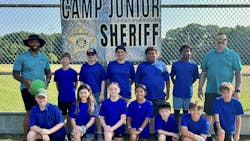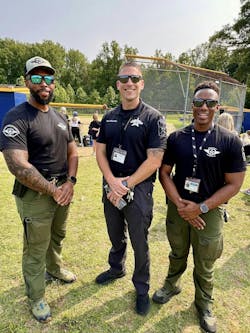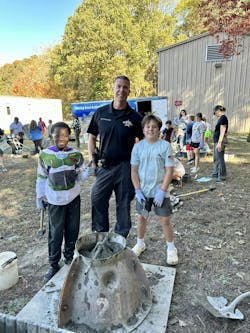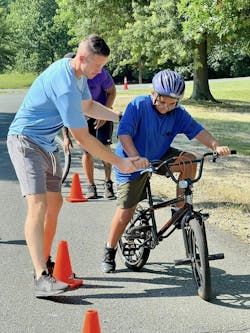What School Resource Officers Do When Classes End for Summer
What to Know
- SROs have transitioned from occasional school presence to full-time roles with diverse responsibilities including community engagement and investigations.
- Summer months are busy for SROs, involving training, community events like D.A.R.E. camps, and relationship building outside the school environment.
- Long-term relationships with students, especially in elementary schools, allow SROs to positively influence their development over multiple years.
More on OFFICER.com
Download the July/August issue of OFFICER Magazine.
Click Here to subscribe to OFFICER Magazine.
A long time ago in a galaxy not so far away… and actually not that long ago, police and sheriffs’ agencies started to assign officers to work in schools with the (then) newly created title of “School Resource Officer (SRO).” Forty years ago, if an officer or deputy was in a high school, it was either for a special event or for a call for service. Having an officer assigned full time to a given school was unheard of. The positions existed here and there in the 1980s and 1990s, but was largely dependent on the crime rate around the given school and within the school itself. After Columbine happened in 1999, the positions existed in more places and grew across the country, from inner-cities out. Now, not only in high schools, it’s more common to see an SRO at a school than not.
As with every law enforcement assignment, though, “the job” never consists of just one responsibility, duty or location. Recently, the topic of “out of school” SROs came up in conversation, and we reached out to an SRO that was known to us: S/Dep. Ryan Spalding of the Calvert County Sheriff’s Office. Previously, Spalding was mentioned in the article from our April/May issue regarding Autism awareness and the development of a communications board for law enforcement use. Our question for Spalding was, “What do you do when schools aren’t open?” Apparently, “vacation” isn’t the only answer. While SROs certainly should (and do) take advantage of the summer out-of-school months to go on vacation, they also have a plethora of other duties that they have to attend to. And mixed in with those duties is also the requirement to attend and successfully complete any training that is required both for their regular law enforcement assignment, any extra certifications they hold and any new certifications they are trying to secure. After all, they all hope to promote at some point (even if it means leaving their SRO assignment).
One thing we shouldn’t have been surprised by (but were) is that SROs are fairly regularly used by the Press/ Public Information Officers (PIO) of a given agency as the subject of community relation photos. It makes perfect sense when you think about it: SROs are out “in the community” every day, either in or at the schools or at other events that the school children might be attending. The perfect example is the Inclusive Track & Field (Special Olympics) events that were held in April. With students from schools all over the county, SROs from various schools showed up and often served as the well-known friendly face for students who might have otherwise felt out of place or somehow disconnected from their usual familiar setting.
It only makes sense that the SROs are also assigned to work events that focus on the students during the summer months. For instance, there are three that the Calvert County Sheriff’s Office hosts: one is the D.A.R.E. Camp and the two others are Camp Junior Sheriff events—one for sixth and seventh graders and one for eighth graders. During these week-long events, the SROs are tasked with educational duties as well as security and safety duties, and let’s not forget the previously mentioned community relations duties.
Of course, there are students in some schools that commit crimes either in the schools or in the community. While the SROs can perform investigations, and do under careful controls to protect these students, they obviously have a high value in assisting the detectives who are charged with investigating those cases. This is especially valuable when the crimes might involve students known to the SRO or the known students might be the victim or the suspect. How well the SRO can assist the detective will depend almost entirely on the rapport that was built with the student(s) in the school, or during school activities.
It’s interesting to note that a given SRO can impact a student throughout the student’s primary education. If the SRO is assigned to an elementary school, then they have six years (K-5th) to get to know the students, helping them, sometimes mentoring them, and modeling courtesy and responsibility throughout the school year as well as at the summer events. Then, when that student goes into middle school, they meet a new SRO, but it’s not like they simply forget the one they had for six years. Then they meet another one or two SROs in high school and end up with three or four SROs that have impacted their lives and development across the span of their primary education years.
It’s precisely because of that long term potential impact that many SROs are now selected through a competitive process. Sure, in some places there are probably SROs who are simply assigned the position, but in those schools and areas where SROs are more mentor than security provision for the students, the process for selection can be quite stringent. The Sheriffs and Chiefs who make the assignments certainly understand the need to have an SRO that presents the agency “at its best.” They often set minimum requirements for fitness, education level, experience (time with the agency) and more. The Calvert County Sheriff’s Office takes applications from deputies for the positions, holds interviews, sometimes requires essays be written on the deputy’s motivation to become an SRO and can look at the deputy’s past assignments and performance demonstrated.
Finally, and a lot of agencies might disagree with this, the principal of the school to which the SRO will be assigned ought to have some say. Principals have a vested interest in the welfare of all students under their charge and it’s reasonable to make sure that they are comfortable with and have faith in the SRO that will be tasked with providing safety and mentoring within the school.
Summer months — out of school time — is a busy and productive time for SROs. It’s a time when agencies can move or replace SROs and there’s a lot for the SROs to get done while they aren’t required to be in their assigned school each day. They are far from being a 10-month per year school employee.
About the Author
Lt. Frank Borelli (ret), Editorial Director
Editorial Director
Lt. Frank Borelli is the Editorial Director for the Officer Media Group. Frank brings 25+ years of writing and editing experience in addition to 40 years of law enforcement operations, administration and training experience to the team.
Frank has had numerous books published which are available on Amazon.com and other major retail outlets.
If you have any comments or questions, you can contact him via email at [email protected].




